Photoblog: Trek to Shri Hemkund Sahib – Highest Gurudwara in the world (June 2017)
This is one of the most special places in Himalayas where we have trekked so far. Shri Hemkund Sahib Gurudwara, at the height of 4,633 Meters (15,200 Feets), is the highest Gurudwara in the world and one of the holiest places for Sikhism.
This trip was part of our mega itinerary where we had planned around 7 treks which included 150 Kms of trekking and whopping 6,000 Kms of travel. We moved from lowest altitude of 216 Meters (New Delhi) to the highest altitude of 4,633 Meters. The brief plan of the trip is as given below.
- Bangalore to New Delhi – Flight
- New Delhi to Haridwar – Train
- Haridwar to Rishikesh to Auli – Private Car
- Auli to Gorsan Top – Trek – 10 Kms (Photoblog)
- Auli to Govindghat – Car – 30 Kms
- Govindghat to Ghanghariya – Trek – 11 Kms (One way)
- Ghanghariya to Hemkund Sahib – Trek – 14 Kms (Two way)
- Ghanghariya to Valley of Flowers – Trek – 12 Kms (Two way) (Photoblog Coming Soon)
- Ghanghariya to Govindghat – Trek 11 Kms (One way)
- Govindghat to Badrinath to Manna Village to Joshimath – Car – 60 Kms (Photoblog Coming Soon)
- Joshimath to Jumma Village to Dronagiri – Car, 30 Kms + 13 Kms trek (One way)
- Joshimath to Chopta to Tunganath Temple to Chandrasheela Peak – Car + 10 Kms trek (Photoblog Coming Soon)
- Return to Dehradun via Rudraprayag and back to Bangalore
This is our second trip the Holi place. This year, we visited in first week of June’17 before the onset of monsoon. Last year, we had visited in mid August during peak monsoon season.
The best months to visit Hemkund Sahib is from May end to Sept. In May and till mid June, the weather is dry but with intermittent showers specially in the afternoon/evenings.
June – Jul – Aug are peak monsoon months and are wet months. However, the flowers in Valley of Flowers and on Hemkund Sahib Marg are on full bloom during these months.
Sept – Oct are dry months and start of winter season. The greenery reduces and the terrain is covered with snow and waterfalls are converted to glaciers.
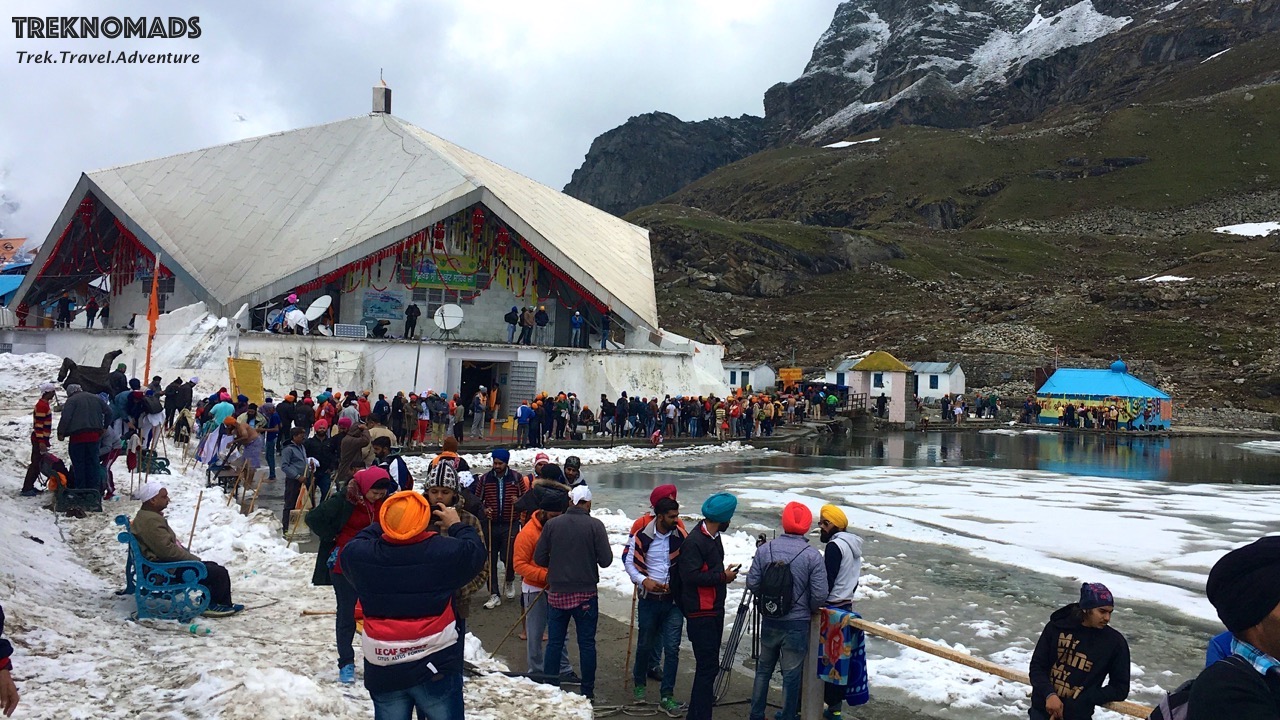 |
| Hemkund Sahib is inaccessible from October through April because of snow bound paths and glaciers. Sikh pilgrims arrive in May and set to work to repair the damage to the path over the winter, which tradition is called kar seva (“selfless service”), a concept which forms an important tenet of the Sikh faith. Photo taken in Jun’17. |
 |
| Our trek to Ghanghariya starts from Govindghat. Govindghat is a town in Chamoli district, Uttarakhand, India, located at the confluence of the Alaknanda and Lakshman Ganga rivers. Lakshman Ganga river comes from Valley of Flowers and Haathi Parvat. There are no ATMs in this place. The last ATM is available in Joshimath, which is around 25 kms away. So if you need cash (which you will need in ghaghariya for 3 days), take it out at Joshimath. Keep around 20K to be on the safer side. From Govindghat helicopter service is also available for those who do not want to hike to Ghanghariya. Govindghat to Ghanghariya is around 15 kms. For first 4 kms, you can take a jeep as it is motor-able road. |
 |
| Lakshman Ganga River runs parallel to the trek route from Govindghat to Ghanghariya. Around 11 kms to hike after first 4 kms of jeep ride. The road is well laid and properly maintained. Beautiful Lakshman Ganga river flows on the right while going up. The descent is gradual and easy for first 7 kms. There are few beautiful waterfalls near by mountains. There are plenty of shops on the route to rest, tea, maggi, parathas etc. Govindghat is at ~1,828 meters above sea level, while Ghanghariya is at 3,049 meters – around 1,200 meter altitude gain in 15 kms. Just relax, walk in a steady pace, take rest when required, drink plenty of water, take lots of photographs. With a steady and relaxing pace, this distance of 11 Kms can be covered in around 5-6 hours. The last 4 kms after the bridge in Bhyunder, the ascent increases and the trek becomes tougher. |
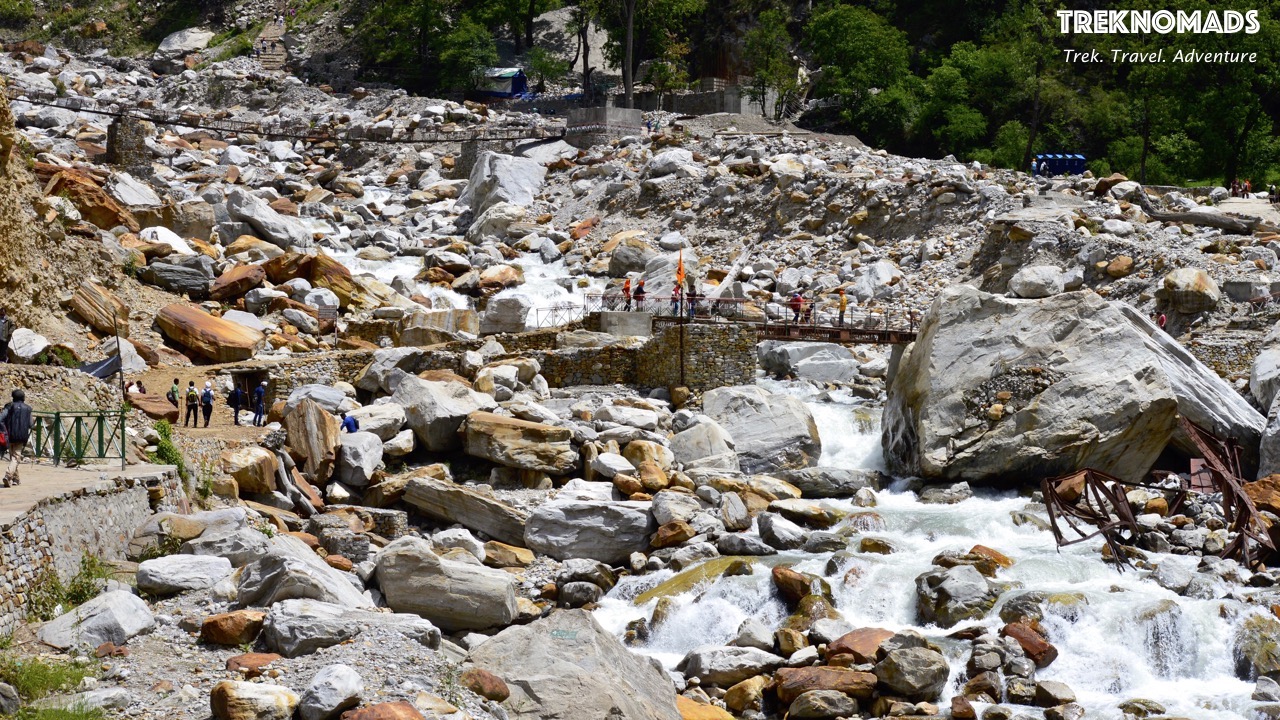 |
Bhyunder Village – around 7kms trek mark. This route hosts thousands of tourists and pilgrims visiting holy Hemkund Sahib every year. Many pilgrims take mules to travel in these routes. Mules are also available on Hemkund Sahib trek. With so many mules, there is so much of mule potty (and lots of smell)! You have to be careful not to put your expensive (Quechua) trekking shoes in one of these  . Mules also walk in zig zag manner and a group of 3-4 follows a leader. Make sure you do not walk towards the valley side of the road when mules are coming towards you. Apart from that these mules are almost harmless. . Mules also walk in zig zag manner and a group of 3-4 follows a leader. Make sure you do not walk towards the valley side of the road when mules are coming towards you. Apart from that these mules are almost harmless. |
 |
| Friendly and sweet kids of Bhyundar Village at one of the many shops during the trek route. |
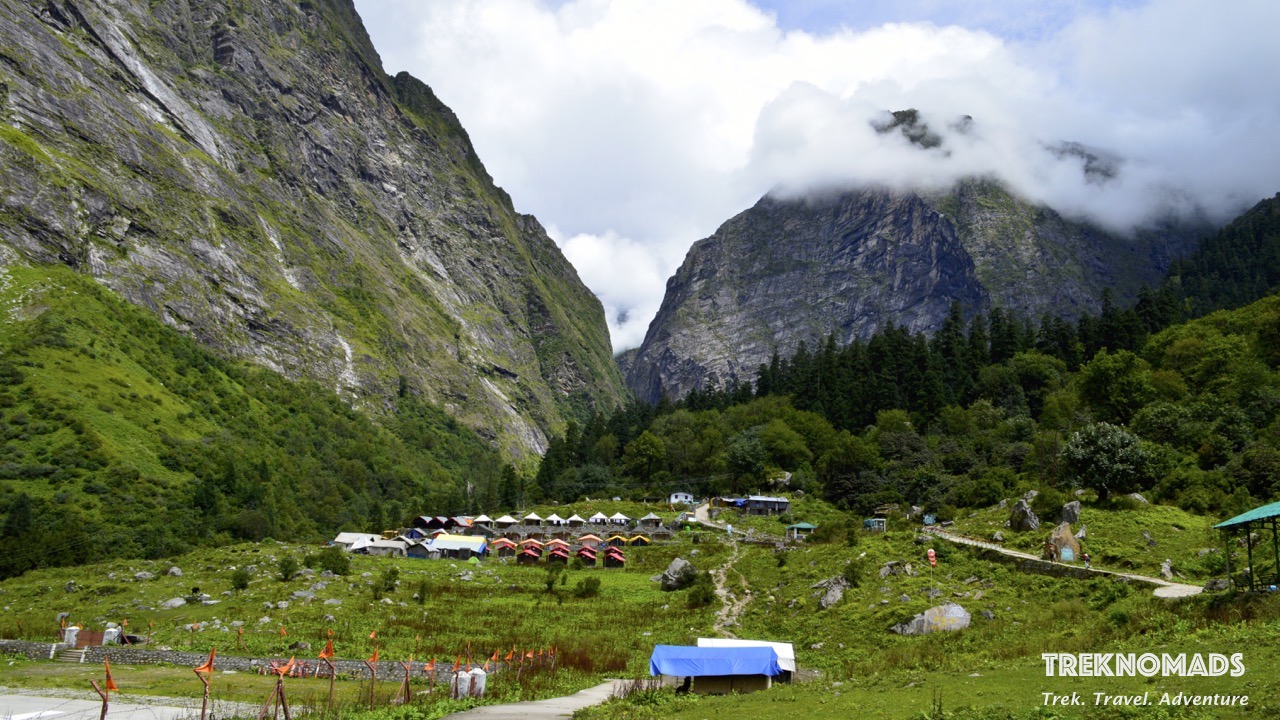 |
The tent site at Ghanghariya. The village of Ghanghariya is just 1 street village. It has few hotels, shops, small restaurants and a Gurudwara. The village is open only during the tourist season which is around April to Oct. Before entrance in the village there is a helipad for tourists who would like to travel by helicopter. The helicopter ride is around Rs 3,000 per person for one way in 2016. Helicopters can be booked by informing your guide or hotel staff. Stay in tents near helipad is also a good experience till it rains. The tents are fitted with private toilets and has power supply. From Helipad, (where we think that we have reached after 10 kms trek), one has to climb another 700-800 meters to reach the hotels. This is one of the toughest climb of the day psychologically.
|
 |
| Helicopter ride from Ghanghariya to Govindghat charges around 3K to 4K depending on season and demand. If you are not interested in trekking 11 kms and do not want to ride pony, this is one good option with amazing views. The ride takes around 3-4 mins only! |
 |
| After around 5 Kms from Pulna Village, the path splits into two: One route goes to the Ghanghariya Village, the other route goes towards another valley near Haathi Parvat. This is also a lesser known trekking route, ready to be explored! This photo shows Haathi Parvat and the surrounding valley. |
 |
| The Hemkund Sahib treks after around 1 km from Ghanghariya village. The other route goes to Valley of Flowers. There is a beautiful waterfall next to the start of the trail. The water in this stream comes from Hemkund Sahib and also provides water to Ghanghariya Village. |
 |
| The entire route is surrounded by towering peaks. |
 |
| The main Hemkund Sahib trail after the initial patch of jungle and before the glacier. The glacier is prominent in winder months. During Summer and monsoon months, glacier melts. |
 |
| This photo is taken on 31st May 2017. Post this the glacier starts. So far we had covered around 4 kms of trail and another 3 kms remained. |
 |
| The massive glacier originates from the top of the mountains. This photo does not provide the actual magnitude of this glacier. The two pilgrims in the corner provides little idea about the massiveness of the glacier. |
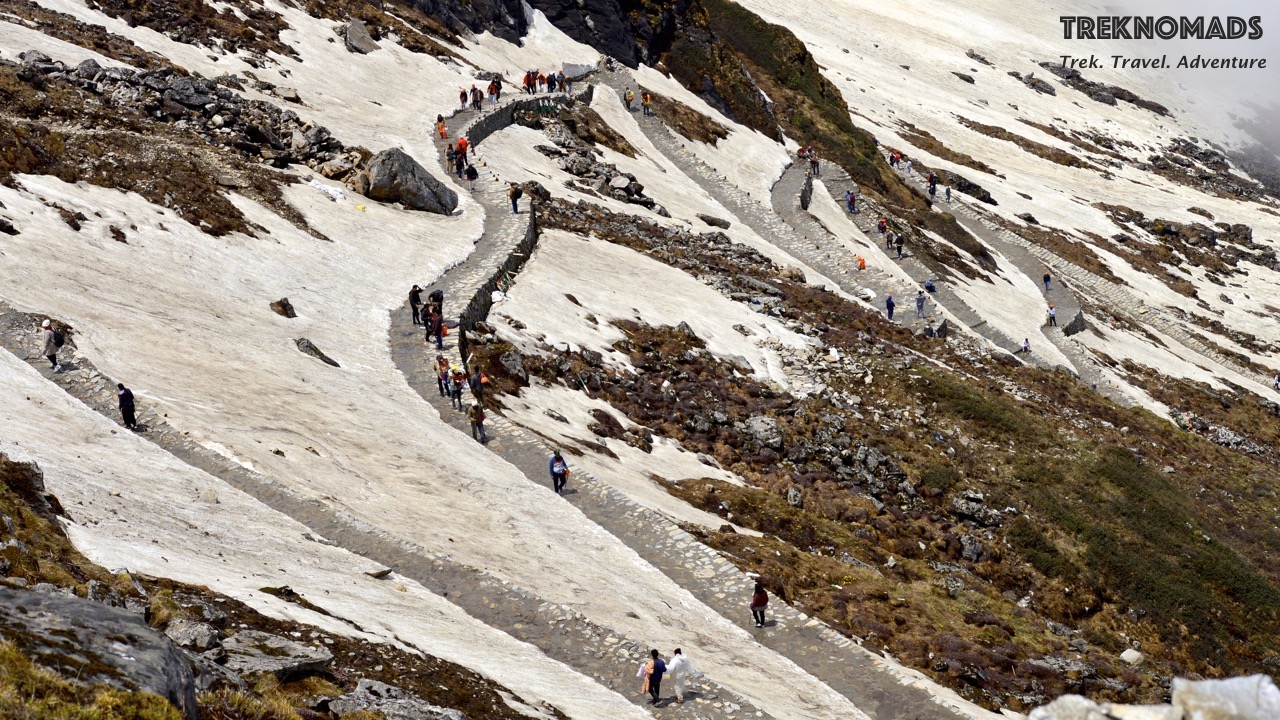 |
| The trail post entering the glacier. This glacier is cut manually by Sikh Volunteers with help on BRO (Border Road Organization) in the months of April every year. The route opens from end of April till Mid Oct, depending on the weather each year. |
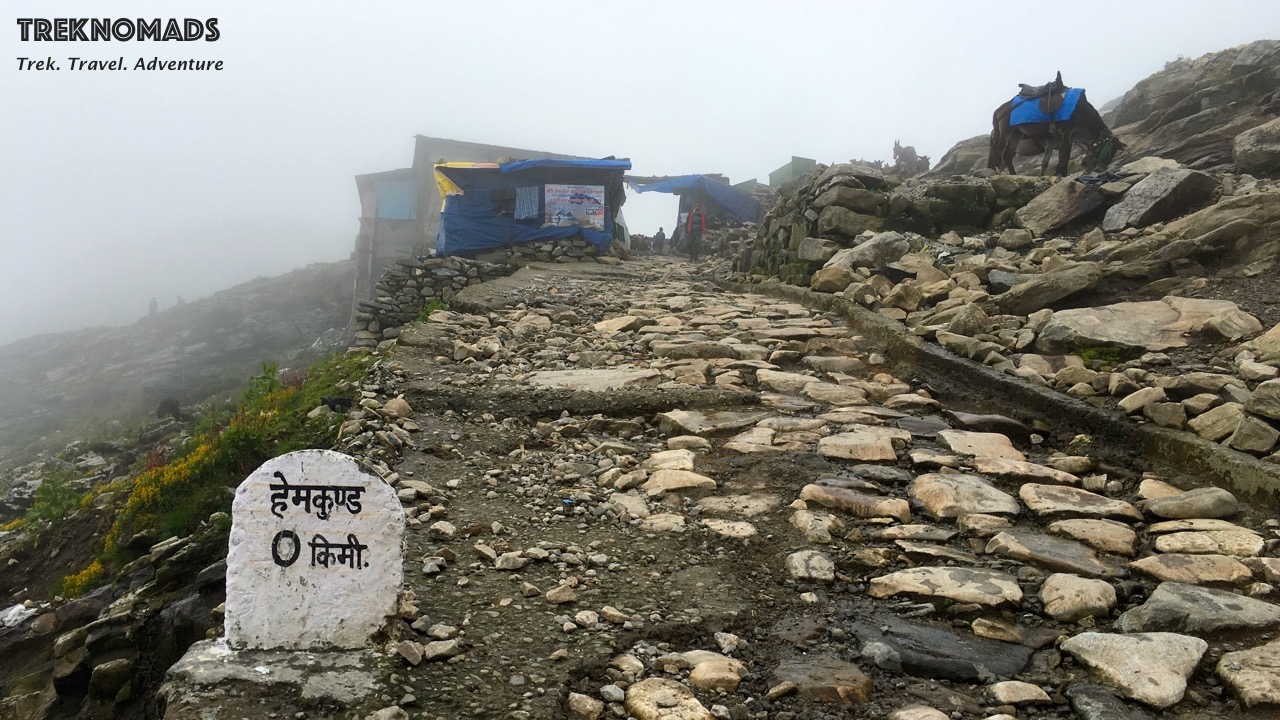 |
| Finally we reached after 4 hours and 7 Kms of tough trek. However the entire trek was refreshing and mesmerising with friendly pilgrims and beautiful views. |
 |
| Shri Hemkund Sahib Gurudwara. A truly amazing place. I had pleasure to visit this place 2 times in different weathers. It was equally amazing both the times. In May end, the Hemkund Sahib Kund was totally frozen. However, many pilgrims were brave enough to take a dip in holy kund in the bitter cold. |
 |
| The view of the Hemkund Sahib trail from Valley of Flowers route. Only the glacier route can be seen if we zoom in the photo towards left corner. |
 |
| The entire trip is not complete without the tasty, nutritious and hot Khichadi Prasad at the Hemkund Sahib Gurudwara. |
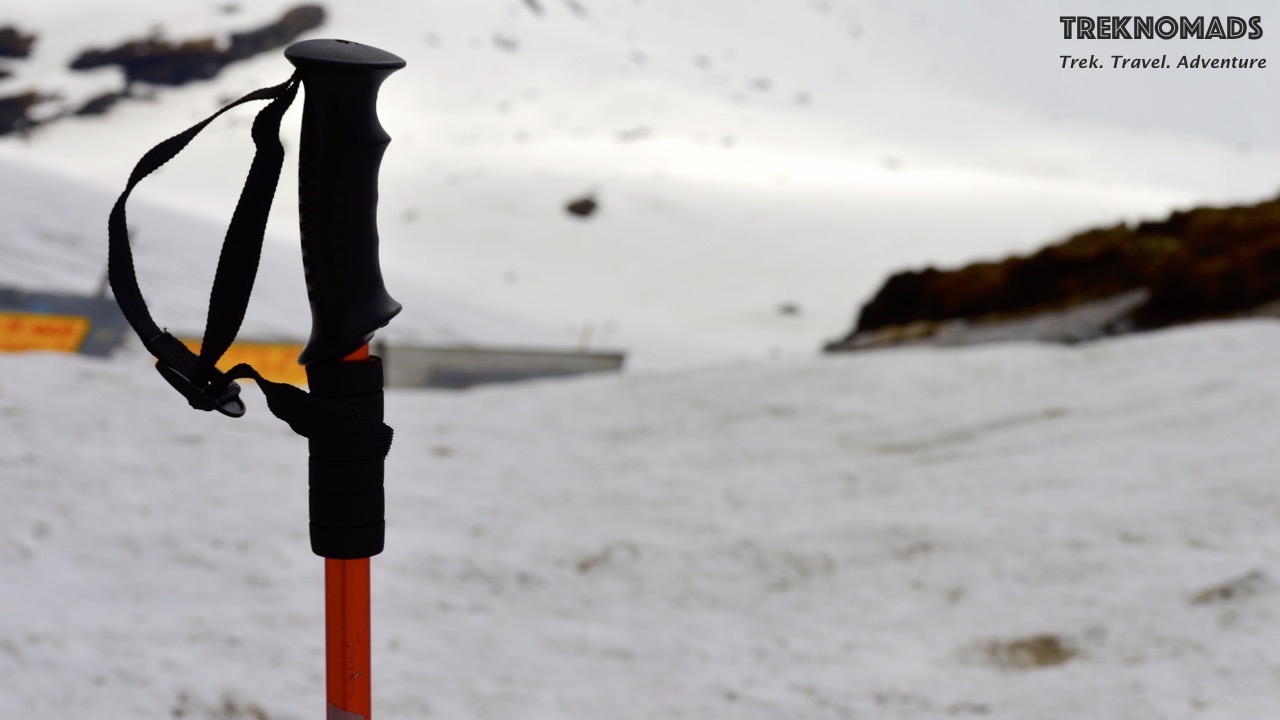 |
For more such trek stories, visit our blog.
TrekNomads – Trek.Travel.Adventure |












 . Mules also walk in zig zag manner and a group of 3-4 follows a leader. Make sure you do not walk towards the valley side of the road when mules are coming towards you. Apart from that these mules are almost harmless.
. Mules also walk in zig zag manner and a group of 3-4 follows a leader. Make sure you do not walk towards the valley side of the road when mules are coming towards you. Apart from that these mules are almost harmless.






[…] Day 5 – Trek to Hemkund Sahib […]
[…] to Gurudwara Sri Hemkund Sahib – 7 Km one […]